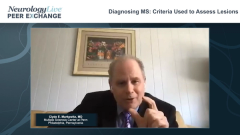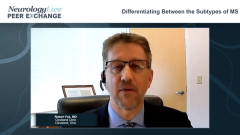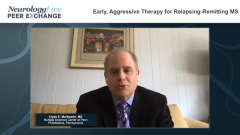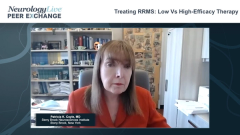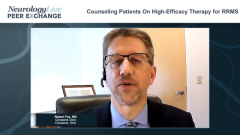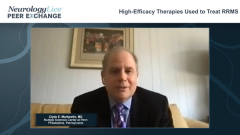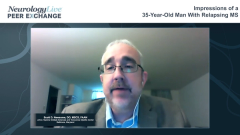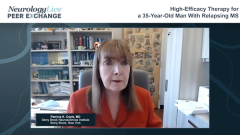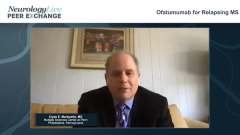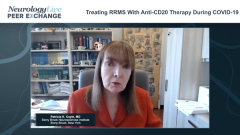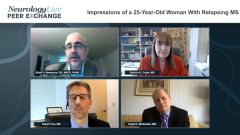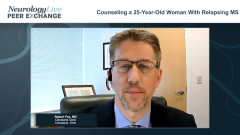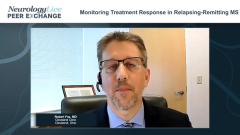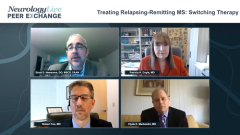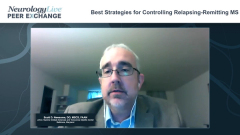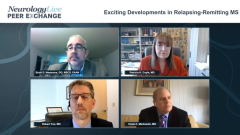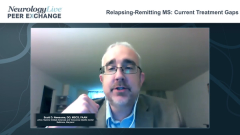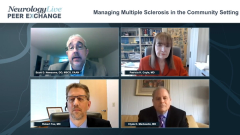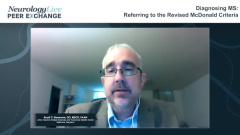
Impressions of a 25-Year-Old Woman With Relapsing MS
Clyde E. Markowitz, MD, reacts to how he would manage a 25-year-old woman who presents with 2 weeks of progressive left-sided monocular vision loss and pain with eye movement, but reports no other symptoms or significant history.
Episodes in this series

Scott D. Newsome, DO, MSCS, FAAN: Let’s go onto another case. It is a bit on the other end of the spectrum in terms of disease activity, but it’s important to think about this. This is a real patient who I saw in my clinic at the Johns Hopkins Multiple Sclerosis and Transverse Myelitis Center. The case is a 25-year-old Caucasian woman who presents with 2 weeks of progressive left-sided monocular vision loss and pain with eye movement with no other symptoms previous to that. The patient is healthy as well: no comorbidities. Her exam showed fairly typical optic neuritis, and she also had diffuse hyperreflexia. An MRI scan of the brain and orbit showed a left-enhancing optic nerve. She had a nonenhancing periventricular lesion and a nonenhancing juxtacortical lesion. We did a lumbar puncture, which showed CSF [cerebrospinal fluid]–restricted oligoclonal bands. Keep in mind the McDonald Diagnostic Criteria for Multiple Sclerosis of both dissemination in time and space.
Clyde, why don’t you kick this off? In this particular patient, what are some of the features that may make you less concerned about jumping right to a high-efficacy drug? Or do you say, “Forget it. Let me just put everyone on high-efficacy treatment”? I know what the answer to that is because you already said that earlier. Tell me a bit about what you would do with this person.
Clyde E. Markowitz, MD: This case actually is a pretty typical case that we all see in our practices. She meets criteria for a diagnosis of MS [multiple sclerosis], which includes her spinal fluid and the lesions on her skin with optic neuritis, but this isn’t a case that’s coming to me with lights blaring that we have to worry that this is going to be a rapidly deteriorating case.
With this kind of case, I have a much broader view of the patient’s world, meaning that this is someone who is 25 years old, so she may be thinking about starting a family in the near future. She is possibly in that childbearing conversation, so I would have a frank conversation with her. The key for a shared decision-making conversation is where she’s going to be in the next year or so and what her plans are. I’m fine with any disease-modifying therapy at this point. I’m always leaning toward a higher-efficacy therapy from the get-go regardless, but if there’s a concern because she may be thinking about getting pregnant in the near future, or if she just got married, then I might consider a different class of medications because I’m not worried. I’m not saying, “Oh my God.” Granted, I’m going to be monitoring her closely regardless. The piece that I don’t want to get burned on is if the next time she has an attack, it’s in her spinal cord and then she cannot walk. I would feel horrible about that, thinking that I should have done something more aggressive.
My general gestalt is that I want to get people on a good high-efficacy compound to begin with, but I have room in the conversation for her. It is not an absolute, so we are going to have many more dialogues to figure out what makes the most sense. If she is comfortable with the idea of going with anti-CD20 agent at that point or possibly 1 of the oral medications, then I would be delighted.
I am generally not starting people on the injectable therapies anymore. It’s not part of my immediate world, so I don’t even bring it up other than to say that it’s out there. We could consider that, but we don’t go that route these days. We typically take this approach.
Scott D. Newsome, DO, MSCS, FAAN: When prospective fellows are coming to interview with you all, I’m going to tell them that. I’m going to say that you’re not going to learn about all the therapies. You may consider not going there.
Clyde E. Markowitz, MD: You can say whatever you want.
Scott D. Newsome, DO, MSCS, FAAN: Come our way.
Clyde E. Markowitz, MD: You can say whatever you want. That’s fine, but I’ll tell them the truth.
Scott D. Newsome, DO, MSCS, FAAN: Thank you for watching this Neurology Live® Peer Exchange. If you enjoyed the content, and I hope you did, please subscribe to our e-newsletters to receive upcoming Peer Exchanges and other great content right in your in-box.
Transcript Edited for Clarity
Newsletter
Keep your finger on the pulse of neurology—subscribe to NeurologyLive for expert interviews, new data, and breakthrough treatment updates.

